
Guests
- Yoruba Richendirector of Promised Land, which looks at legal struggles over land ownership in contemporary South Africa. She’s also a former Democracy Now! producer. Most recently she co-produced and wrote The New Black, which is playing in film festivals now and set to air on PBS next year. The film plays at Frameline, the nation’s largest LGBT film festival, in San Francisco.
Filmmaker Yoruba Richen describes how the election of Nelson Mandela as president of South Africa inspired some of the six million blacks who were forcefully removed from their land and resettled into so-called “homelands” to try and reclaim their land. We play excerpts from her film, Promised Land, which takes a critical look at land reform and racial reconciliation in the new South Africa. “We have to remember it is still a relatively new democracy,” Richen says. She notes Mandela “had great foresight about what we needed to do to progress, and to move forward, and to take off and remove the chains it had been bound under apartheid.”
Click here to see our recent interview with Yoruba Richen about her new film, The New Black.
AMY GOODMAN: This is Democracy Now!, democracynow.org, The War and Peace Report. I’m Amy Goodman. We’re joined by filmmaker Yoruba Richen. She directed, co-produced and wrote the film The New Black. Her previous film, Promised Land, looked at legal struggles over land ownership in contemporary South Africa. She’s also a former Democracy Now! producer. In Promised Land, she takes a critical look at the land reform and racial reconciliation movements in the new South Africa. I want to play a clip, which includes some of the history of how an estimated six million South African blacks were dispossessed of their land and how the election of Nelson Mandela to the presidency inspired some of the people profiled in her film.
NEWSREEL: The Secretary for Bantu Administration and Development, circular number 25, 1967: “It is accepted government policy that the Bantu are only temporarily resident in the European areas of the republic, for as long as they offer their labour there. It must be stressed that no stone is to be left unturned to achieve the resettlement in the homelands of non-productive Bantu at present residing in the European areas.”
BLESSING MPHELA: There was a plethora of legislation and acts that regulated people’s ownership and relationship with the land in the past. In most instances, areas where—which were owned by black people in the country were declared black spots. And that’s where people were forcefully removed from their land. And we’re talking about six million people in the past who were removed from their land in South Africa.
MAKHATOLLIL: The day we were moved, no one believed. We did not want to believe that we were supposed to leave a home that we have known ever since. It was unacceptable. It was so painful to everyone. But since we had no powers, we were—we had to move. We still have wounds that won’t heal now. We may forgive you, but I don’t think we will forget that.
SOLLY SELIBI: After the eviction, our people got very much angry, because our grandfathers are buried around here. We could not even come to our graveyards. When I have to come here and see my father here, I have got to run around, ask for the owner. Sometimes he doesn’t allow us to go to the graveyard today. So, we became very much bitter, but fortunate enough, the government of ANC, democratic government, decided to give us that allowance, that right to claim the land.
UNIDENTIFIED WOMAN: We now request the president-elect of the Republic of South Africa, Mr. Nelson Rolihlahla Mandela, to proceed to the table.
SOLLY SELIBI: We saw this in newspapers, and we heard it over the radios: claim, claim, claim, claim.
MAKHATOLLIL: It was in 1998. Solly and Philip are my ex-schoolmates, and they suggested to me, “What do you think? How about us filing a claim for the land that we were forcefully removed from?”
AMY GOODMAN: An excerpt of Yoruba Richen’s film, Promised Land. Yoruba, this is a critical time in South Africa. Put what we’re seeing now in this transition period—Nelson Mandela coming to the end of his life at the age of 94, in the hospital, everyone gathered 'round—the South Africa you're describing in this film?
YORUBA RICHEN: Well, one of the things that I learned in making this film was that the ANC, led by Nelson Mandela, of course, part of their 10—I believe it was their 10 fundamental things that they wanted for the freedom struggle, number two was land reform. It was that. It was a part of the freedom struggle from the very, very beginning.
AMY GOODMAN: Number one was?
YORUBA RICHEN: I forget. But it was—you know, this was fundamental to how the country was going to be transformed. I think often people—you know, people don’t know that. And Nelson Mandela—we have one character in the film who says, you know, “Nelson Mandela said, 'Claim.' And now we have to claim and make Africa ours. It’s not that we’re trying to kick white people out, but we have to make it. We have to own it.” So, you know, that has not happened in the country, and South Africa faces many, many challenges still. We have to remember it’s a new—it’s still a relatively new democracy. But Nelson Mandela was—is, and was when he was a leader—you know, great foresight, obviously, about what the country needed to do to progress and to move forward and to take off and remove the chains of—you know, that it had been bound under, under apartheid.
So, I think that all of us who are inspired by Nelson Mandela all around the world, who are inspired by South Africa—you know, I shot there over the course of three years, and I brought my mom there. You know, as I said before, we followed the freedom struggle, went to see Nelson Mandela at Yankee Stadium, saw Desmond Tutu at Riverside Church. It was something that was a part of our civil rights movement in the '80s. But we also know that South Africa has a lot of challenges that it needs to meet. And I'm sure the leaders there—you know, and not just Jacob Zuma, but other members of ANC and other parts of the—you know, and other parties—are looking at how to move forward and really are taking this time to see and to figure out the best way that the country can move forward.
AMY GOODMAN: I want to go to the end of your film, Promised Land, which aired on POV in 2010. One of the people you profile in the film reflects on the legacy of former President Nelson Mandela.
PHILIP RAFEDILE: We are Africans. We don’t say they are not Africans. We don’t say whites are not African. But we must be seen. Running this country, we must be seen developing this country. Mandela is old. Mandela did his work, sacrificing for 27 years in jail. He was there for us. So, we can’t expect the old man to do everything for us. He said, “Now, claim.” And we have to make sure that we make his dream come true.
AMY GOODMAN: That’s Philip Rafedile in the film Promised Land, Yoruba Richen the director. So moving at the end here.
YORUBA RICHEN: And that is what’s so beautiful about being in South Africa and why the nation—you know, why I love what I’ve been reading about, you know, what’s happening. The nation waits for—to see what’s going to happen, because he is the father of the nation. And people really feel that, and they feel that in terms of the politically and in terms of, again, how the country has to move forward.
AMY GOODMAN: Yoruba, your new film is called The New Black, and it’s about LGBT rights in this country and the black community, the black church. How do you relate these two films?
YORUBA RICHEN: It’s amazing how everything is connected. And South Africa was one of the first, when it—enshrined in its constitution was a right for gay people to marry and gay rights. It was the first country to do that. I believe it was the first country to do that within its constitution. So, again, Nelson Mandela and the ANC had such foresight around expansion of rights and what freedom means. And because of the history of apartheid—I mean, it gives me chills thinking about it—they knew, way back in the '90s when no one was talking about gay marriage or LGBT rights within—enshrined in a country's constitution, that if they were creating a new country of democracy, rights had to be extended to everyone. And Nelson Mandela lived that. You know, it’s—the other challenges that South Africa faces, that South Africa faced, faces today, is there is an epidemic of violence and violence against LGBT folks, that people are really working in the country to stop and to—you know, to look at the root causes of. And Nelson Mandela—I mean, that was not—that’s not his legacy. And South Africa was an inspiration to us all when it enshrined in its constitution the LGBT rights and became one of the first countries to allow gays to marry. So, it’s—you know, he’s a beacon for freedom and justice for all people. I mean, that’s—I don’t know what else to say. He’s—that’s who he is. And we—you know, I feel so privileged that I’ve been able to see—I wasn’t alive with Martin Luther King or Malcolm X—but that I’ve been able to see and read and devour his words and his work.
AMY GOODMAN: Let’s go one more time—in the first part of the interview, we played Nelson Mandela, showed him at Yankee Stadium, but you were there. And let’s end with Nelson Mandela. This is from Danny Schechter’s film Mandela in America. He speaks in Yankee Stadium just months after he’s released from Pollsmoor Prison. He was introduced by Harry Belafonte.
HARRY BELAFONTE: Never in the history of humankind has there ever been a voice that has more clearly caught the imagination and the spirit and fired the hope for freedom than the voice of the deputy president of South Africa, Nelson Mandela.
NELSON MANDELA: The principle of “one person, one vote” on a common and non-racial voters’ roll is therefore our central strategic objective. Throughout our lifetime, we have fought against white domination and have fought against black domination. We intend to remain true to this principle to the end of our days.
AMY GOODMAN: Nelson Mandela at Yankee Stadium in 1990, months after he was released from prison. And that’s from Danny Schechter’s film Mandela in America. You were a senior in high school when you went to Yankee Stadium, Yoruba?
YORUBA RICHEN: Yeah, it was senior year. And before that, I had actually volunteered at Danny Schechter’s—the TV show that Danny Schechter produced, South Africa Now.
AMY GOODMAN: Which was on PBS stations around the country.
YORUBA RICHEN: Which was on PBS, yeah. And it was down in Soho. I was transcribing. It was the first job in journalism I ever had. My mom said, “You want to—you know, you want something interesting to do? Go volunteer there.” And it was amazing. So, this—you know, his story and the story of South Africa is something that I think me, but we as a community, as African Americans, and not just African Americans, but—followed so closely and were so invested in. You know, it’s—and we still need to be following it and invested in it, because Africa—President Obama is in Africa right now. Africa—
AMY GOODMAN: Headed to South Africa.
YORUBA RICHEN: Headed to South Africa.
AMY GOODMAN: Visiting Gorée Island, as we speak.
YORUBA RICHEN: Exactly. So, Africa is a diverse continent. I’ve had the pleasure now to visit other places in Africa. South Africa is a unique country but is, in some ways, the engine of the continent. And we need to pay a lot more attention to what’s happening in Africa. It’s a vibrant continent. There’s economically so many exciting things happening. And it also has a lot of challenges. And we haven’t paid enough attention to it as a country in the U.S.
AMY GOODMAN: Yoruba Richen, I want to thank you for being with us. Yoruba Richen directed, co-produced and wrote—well, her new film is called The New Black, which is playing in film festivals around the country. It’s at the Frameline Festival in San Francisco this weekend. Her previous film, Promised Land, which looked at the struggles over land reform in South Africa, aired on PBS in 2010. This is Democracy Now!, democracynow.org, The War and Peace Report. I’m Amy Goodman and so proud that Yoruba Richen was a producer at Democracy Now!

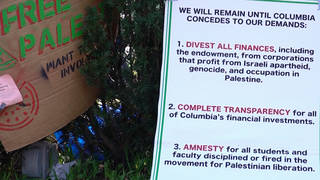
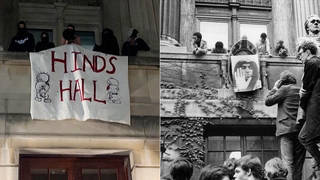
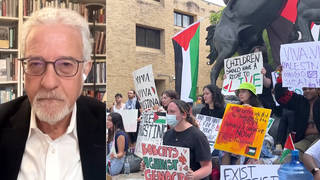
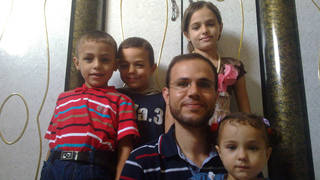





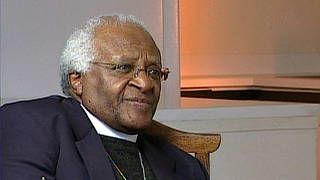
Media Options